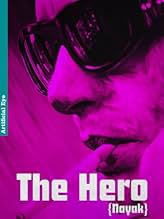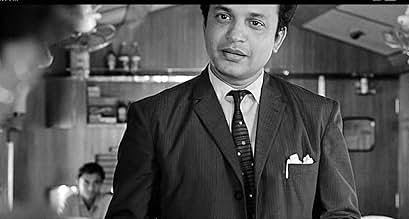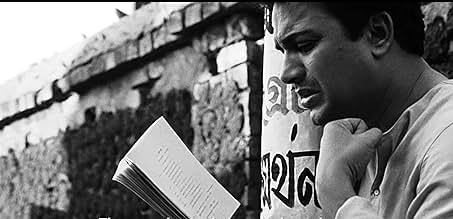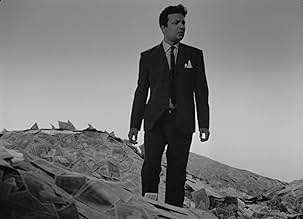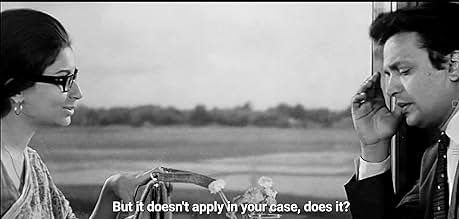CALIFICACIÓN DE IMDb
8.3/10
5.7 k
TU CALIFICACIÓN
Agrega una trama en tu idiomaEn route to Delhi to receive an award, a Bengali film star reevaluates his success through his fellow passengers, dreams, and past experiences.En route to Delhi to receive an award, a Bengali film star reevaluates his success through his fellow passengers, dreams, and past experiences.En route to Delhi to receive an award, a Bengali film star reevaluates his success through his fellow passengers, dreams, and past experiences.
- Premios
- 8 premios ganados y 1 nominación en total
Kamu Mukherjee
- Pritish Sarkar
- (as Kamu Mukhopadhyay)
Susmita Mukherjee
- Molly (Mr. Sarkar's wife)
- (as Susmita Mukhopadhyay)
Subrata Sensharma
- Ajoy
- (as Subrata Sen)
Jogesh Chatterjee
- Aghore, elderly journalist
- (as Jogesh Chattopadhyay)
Satya Banerjee
- Swamiji
- (as Satya Bandyopadhyay)
Opiniones destacadas
'Nayak' starts with two news headlines about movie star Arindham (Uttam Kumar). One headline states that Arindham got involved in a brawl and the other states his nomination for a prestigious award. While travelling to Delhi by train (in order to receive the award) he comes across various people including a young simple but modern journalist Aditi (Sharmila Tagore) to whom he confides his inner thoughts. In the process, the actor further discovers himself and his fear. Aditi too is moved as her prejudice against the cocky pompous movie star changes while she discovers the man behind the name.
Ray cleverly tells Arindham's story about how he made it to stardom, his sacrifice of his art, loss of friends leading to isolation, fear of failure, seeking comfort in alcohol, his inner conflict...He weaves it all into a screenplay that takes place during a train trip from Calcutta to Delhi. A lot of it is shown in flashback mode. The dream sequences are another example of fine writing and execution. We're also given a brief view of the corrupt world of cinema, how art is long lost and how it's become all about money, fame and name...very relevant and applicable to today's Indian film industry.
Uttan Kumar, being the biggest star in Bengali Cinema perfectly fits the part. One wonders how much of the character resembles Kumar in real life. Though Ray is known to cast Soumitra Chatterjee (who happened to be Kumar's arch rival) in most of his films, he made the correct decision by casting Kumar for I cannot imagine anyone else play the part. Sharmila Tagore is wonderful. The actress has an amazing presence and with her grace, simplicity and sincerity, she shines. 'Loved her scenes with Uttam.
Like most of Ray's powerful work, 'Nayak' is a rather less known but remarkable film. One of my favorites!
Ray cleverly tells Arindham's story about how he made it to stardom, his sacrifice of his art, loss of friends leading to isolation, fear of failure, seeking comfort in alcohol, his inner conflict...He weaves it all into a screenplay that takes place during a train trip from Calcutta to Delhi. A lot of it is shown in flashback mode. The dream sequences are another example of fine writing and execution. We're also given a brief view of the corrupt world of cinema, how art is long lost and how it's become all about money, fame and name...very relevant and applicable to today's Indian film industry.
Uttan Kumar, being the biggest star in Bengali Cinema perfectly fits the part. One wonders how much of the character resembles Kumar in real life. Though Ray is known to cast Soumitra Chatterjee (who happened to be Kumar's arch rival) in most of his films, he made the correct decision by casting Kumar for I cannot imagine anyone else play the part. Sharmila Tagore is wonderful. The actress has an amazing presence and with her grace, simplicity and sincerity, she shines. 'Loved her scenes with Uttam.
Like most of Ray's powerful work, 'Nayak' is a rather less known but remarkable film. One of my favorites!
A least seen movie of Satyajit. Satyajit is one of the very few great directors who worked outside Hollywood circle and gave a lot to the film history. He is mostly know to the movie lovers as the creator of great APU TRILOGY. I feel that Ray's works are severely under-represented in USA, although most of his works are masterpiece or near-masterpiece. Thanks to Ishmael Marchent for arranging a retrospective on Ray's works at USA in 1996, I guess. But again in that retrospective, I didn't see the names of some of his great works, like NAYAK, KUNCHENJUNGHA, SEEMABADHYA, ARANYER DIN RATRI or SONAR KELLA. Names of the films that I always see in a Satyajit Festival are the APU TRILOGY, JALSHAGHAR, CHARULATA, GHARE-BAIRE ... etc. No doubt that all of those are great works of Ray, but indeed one cannot know the power of his filmmaking unless he sees some of his other less known works (some of which I mentioned).
Nayak is a simple story of the most popular Film Actor of India, acted with all perfection by great Indian Actor Uttam Kumar, who goes to the capital city Delhi to receive an award of his achievement via a train. On the train he meets Shormila Tagore (Another favorite actress of Satyajit whom he casted in several other movies like, Apur Sansar, Devi, Aranyer Din Ratri, Seemabadhya ... etc.) and some other characters of the story. The story progresses when Uttam discusses with different aspects of his life and career with others (especially with Shormila). In depth thoughts and feelings of UTTAM sprung out as time goes by and Shormila discovers the very lonely man in Uttam hidden behind his day to day charismatic lifestyle.
On my judgement, NAYAK is the greatest creation of RAY. UTTAM's acting can challenge anyone in the motion picture history. The high abstratness and philosophical bent of the movie is comparable to that of CITIZEN KANE (according to me, better than CITIZEN KANE) and the mutual conversations among the characters or the screenplay in other words, can beat those of MINDWALK, VANYA ON 42nD STREET, RED or CASABLANCA. A must see film for all great movie lovers. A 10+ out of 10.
Nayak is a simple story of the most popular Film Actor of India, acted with all perfection by great Indian Actor Uttam Kumar, who goes to the capital city Delhi to receive an award of his achievement via a train. On the train he meets Shormila Tagore (Another favorite actress of Satyajit whom he casted in several other movies like, Apur Sansar, Devi, Aranyer Din Ratri, Seemabadhya ... etc.) and some other characters of the story. The story progresses when Uttam discusses with different aspects of his life and career with others (especially with Shormila). In depth thoughts and feelings of UTTAM sprung out as time goes by and Shormila discovers the very lonely man in Uttam hidden behind his day to day charismatic lifestyle.
On my judgement, NAYAK is the greatest creation of RAY. UTTAM's acting can challenge anyone in the motion picture history. The high abstratness and philosophical bent of the movie is comparable to that of CITIZEN KANE (according to me, better than CITIZEN KANE) and the mutual conversations among the characters or the screenplay in other words, can beat those of MINDWALK, VANYA ON 42nD STREET, RED or CASABLANCA. A must see film for all great movie lovers. A 10+ out of 10.
Though Uttamkumar is not the favorite of the class audience as opposed to Saumitra Chatterjee, the favorite of Satyajit Ray himself, this movie is one of the two occassions where Uttam and Satyajit came together and the outcome is a masterpiece. To me, this is the best creation of Ray. Satyajit rightly chose one and only Uttam as the 'Nayak'.Undoubtedly, Uttam,whose movies are intimately woven to every bengali's life even after 24 years of his death, is the alltime silver screen idol of all generations of Bengali film lovers. Though Uttam didn't get the much blessings of the classy directors compared to his arch rival Soumitra, this is one of the few occassions where Uttam got the chance to prove his acting skill and explioted to the fullest extent.
The story starts when there are two news regarding Arindam, played by uttam, published in the news papers - one is the fighting in a night club and the other that he has been nominated for a prestigeus award. In a train journey to delhi, he reveals himself to a lady reporter played by Sharmila. It was a self digging in a form of informal interview. The movie shows the public life and the personal life of a celebrity and all within the time span of a train journey and the flashbacks.
Finally, whoever likes good movie and haven't seen it already, its should be a must-see one.
The story starts when there are two news regarding Arindam, played by uttam, published in the news papers - one is the fighting in a night club and the other that he has been nominated for a prestigeus award. In a train journey to delhi, he reveals himself to a lady reporter played by Sharmila. It was a self digging in a form of informal interview. The movie shows the public life and the personal life of a celebrity and all within the time span of a train journey and the flashbacks.
Finally, whoever likes good movie and haven't seen it already, its should be a must-see one.
This film from director Satyajit Ray reminded me a little bit of Ingmar Bergman's 'Wild Strawberries', as in each case a protagonist takes a trip in order to receive a big award, and thinks back on his life with some regrets. In this case, it's not an elderly professor, it's a middle-aged movie star (Uttam Kumar), and instead of a car ride with a daughter-in-law, it's a train trip where he meets a young journalist (Sharmila Tagore). She serves as his conscience and mirror over a series of discussions the pair have, and what she reflects is often not very pretty.
At the film's outset the famous star seems to have it all with his success and good looks, and Kumar looks pretty damn cool in shades and when he blows smoke rings. It's soon apparent that he's so worried about someday losing his fame that he's lost bits of his humanity along the way. Via flashbacks we find that he's done some petty things to others, abandoned the altruistic cause of a friend, and taken advantage of women who want to get into films. There is something empty and pathetic about his life that those who get to know him see, including the journalist and a mother and daughter in his compartment who are adoring fans, but see how he pops sleeping pills and gets plastered. And yet, he's always cast as a hero (a 'nayak'), and to the legions of fans who crowd around him in the train stations, he is one.
The meaning of that is pretty clear, but it's not as simple as just showing us how someone on a pedestal may be unworthy of being there. More generally, the film shows us how the most outwardly successful people may be damaged or flawed within, and carry a lot of insecurity. It does this in a thoughtful and reflective way, avoiding simple black/white characterizations. Ray adds depth to the story with a subplot in which a salesman wants his wife to be friendly to another man in order to help win him over. It adds to the overall question, to what lengths should one go in order to be (financially) successful? And regardless of whether one can stay on top, he reminds us via a powerful dream sequence featuring skeletal arms poking up out of mounds of cash, that death will come for us all.
The performances are all fantastic, including an old curmudgeon who eschews "modern movies", and Tagore, who is intelligent, sassy in a reserved way, and beautiful too. I liked how Ray didn't have her succumb to the movie star's charms, as a weaker director/writer might have done. He also uses the train very well, both in moving the action around its various compartments and aisles, and in giving us the scenery outside. In one moment Kumar stares down at the adjacent rail track streaming by with a glint of light on it, and it made me wonder if he was wishing he could be like that rail, staying straight as the train of life rumbled along, and always in the light. The film also made me wonder if the main character reflected a little of Ray himself, who by this time was famous (ala Fellini's 8 ½). It's a film that I might rate higher with a second viewing, and may have held back a little here because I have a slight aversion to stories involving the problems of famous people. It was memorable and had a strong ending.
At the film's outset the famous star seems to have it all with his success and good looks, and Kumar looks pretty damn cool in shades and when he blows smoke rings. It's soon apparent that he's so worried about someday losing his fame that he's lost bits of his humanity along the way. Via flashbacks we find that he's done some petty things to others, abandoned the altruistic cause of a friend, and taken advantage of women who want to get into films. There is something empty and pathetic about his life that those who get to know him see, including the journalist and a mother and daughter in his compartment who are adoring fans, but see how he pops sleeping pills and gets plastered. And yet, he's always cast as a hero (a 'nayak'), and to the legions of fans who crowd around him in the train stations, he is one.
The meaning of that is pretty clear, but it's not as simple as just showing us how someone on a pedestal may be unworthy of being there. More generally, the film shows us how the most outwardly successful people may be damaged or flawed within, and carry a lot of insecurity. It does this in a thoughtful and reflective way, avoiding simple black/white characterizations. Ray adds depth to the story with a subplot in which a salesman wants his wife to be friendly to another man in order to help win him over. It adds to the overall question, to what lengths should one go in order to be (financially) successful? And regardless of whether one can stay on top, he reminds us via a powerful dream sequence featuring skeletal arms poking up out of mounds of cash, that death will come for us all.
The performances are all fantastic, including an old curmudgeon who eschews "modern movies", and Tagore, who is intelligent, sassy in a reserved way, and beautiful too. I liked how Ray didn't have her succumb to the movie star's charms, as a weaker director/writer might have done. He also uses the train very well, both in moving the action around its various compartments and aisles, and in giving us the scenery outside. In one moment Kumar stares down at the adjacent rail track streaming by with a glint of light on it, and it made me wonder if he was wishing he could be like that rail, staying straight as the train of life rumbled along, and always in the light. The film also made me wonder if the main character reflected a little of Ray himself, who by this time was famous (ala Fellini's 8 ½). It's a film that I might rate higher with a second viewing, and may have held back a little here because I have a slight aversion to stories involving the problems of famous people. It was memorable and had a strong ending.
Satyajit Ray's Nayak tells the story of a film star. Of course, in mainstream Indian cinema, leading men are known as heroes, and the interesting paradox about the star of this film (which is probably true of most film stars who enjoy great public adulation) is that beneath this fake façade of stardom, fans, and fame, lies a man with a truly wounded soul, someone who has seemingly accomplished everything in his career but has actually accomplished nothing of what he would have probably wished for, both a person and and as an artiste. A very interesting concept of course which is adapted onto the screen in a most authentic and engaging picture. The film might not be Ray's best film, but it's still Ray's film after all, so how can one even expect anything less than that.
Satyajit Ray is, needless to say (sometimes even embarrassing to have to say that), a master director, a master storyteller, and this film is no exception in the illustrious list of evidence to his talent. Nayak is meaningful, highly absorbing, and to me it's a visual treat. The camera work and lighting are spectacular for a black-and-white film, and the setting of most of the story within a train makes for a delightful watch not only visually but culturally. Culturally because the decorative elegance, the restaurant, the order, as well as the crowd of passengers, wouldn't normally be associated with Indian trains of that period and might raise several eyebrows among non-Indians. The moving train demonstrates breathtaking views as the script moves through its conversational episodes.
Nayak works as a story, as a film, but in many ways as a poem, full of hidden, thought-provoking messages, and as a psychology textbook full of interesting insights of the human soul. The film also provides the viewer with a glimpse into the world of filmmaking from the actors' standpoint. While the story of a film hero who is actually nothing of the sort in real life is actually not big news to anyone nor is it a terribly original idea for a film, Ray makes it into such a personal story that the lead character's being an actor becomes just a random plot element. Ray takes us into his troubled world and does so with extraordinary symbolism. Take the dream sequences just as an example of Ray's profound mastery.
Naturalistic acting is to be expected in Ray films. Uttam Kumar is excellent in this author-backed role. Very few films of that era, not only in India, allowed this much of character depth and complexity, in fear of confusing the moviegoing public, but Ray knew how to balance it well, and Kumar plays the mix of Arindam's stylish appearance and inner conflict exceedingly well. Sharmila Tagore is luminous as the young, morally upright and compassionate journalist who learns to see the person behind the star and the story behind the item. She is grace personified with her elegant demeanor and restrained delivery. These two make this film what it is, and their interactions give the film its intellectual weight. The conclusion of the story is more than optimistic thanks to Ray's keen, optimistic vision.
Satyajit Ray is, needless to say (sometimes even embarrassing to have to say that), a master director, a master storyteller, and this film is no exception in the illustrious list of evidence to his talent. Nayak is meaningful, highly absorbing, and to me it's a visual treat. The camera work and lighting are spectacular for a black-and-white film, and the setting of most of the story within a train makes for a delightful watch not only visually but culturally. Culturally because the decorative elegance, the restaurant, the order, as well as the crowd of passengers, wouldn't normally be associated with Indian trains of that period and might raise several eyebrows among non-Indians. The moving train demonstrates breathtaking views as the script moves through its conversational episodes.
Nayak works as a story, as a film, but in many ways as a poem, full of hidden, thought-provoking messages, and as a psychology textbook full of interesting insights of the human soul. The film also provides the viewer with a glimpse into the world of filmmaking from the actors' standpoint. While the story of a film hero who is actually nothing of the sort in real life is actually not big news to anyone nor is it a terribly original idea for a film, Ray makes it into such a personal story that the lead character's being an actor becomes just a random plot element. Ray takes us into his troubled world and does so with extraordinary symbolism. Take the dream sequences just as an example of Ray's profound mastery.
Naturalistic acting is to be expected in Ray films. Uttam Kumar is excellent in this author-backed role. Very few films of that era, not only in India, allowed this much of character depth and complexity, in fear of confusing the moviegoing public, but Ray knew how to balance it well, and Kumar plays the mix of Arindam's stylish appearance and inner conflict exceedingly well. Sharmila Tagore is luminous as the young, morally upright and compassionate journalist who learns to see the person behind the star and the story behind the item. She is grace personified with her elegant demeanor and restrained delivery. These two make this film what it is, and their interactions give the film its intellectual weight. The conclusion of the story is more than optimistic thanks to Ray's keen, optimistic vision.
¿Sabías que…?
- TriviaDirector Satyajit Ray had written the script of this movie considering only Uttam Kumar in the lead role. He had confessed that if Uttam Kumar had refused it, he would've abandoned the project altogether.
- Citas
Arindam Mukherjee: There's no scope of overacting in front of camera; if you overact a little, then it will magnify tenfold in the camera.
- ConexionesReferenced in Autograph (2010)
Selecciones populares
Inicia sesión para calificar y agrega a la lista de videos para obtener recomendaciones personalizadas
- How long is The Hero?Con tecnología de Alexa
Detalles
- Tiempo de ejecución1 hora 57 minutos
- Color
- Mezcla de sonido
- Relación de aspecto
- 1.37 : 1
Contribuir a esta página
Sugiere una edición o agrega el contenido que falta


